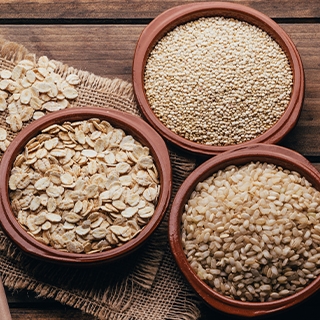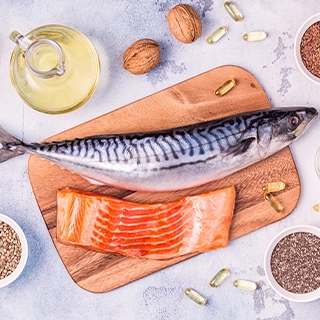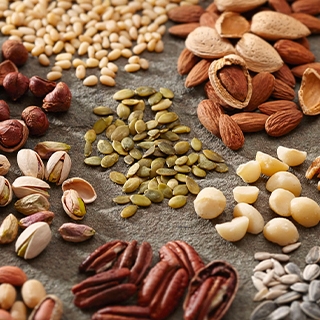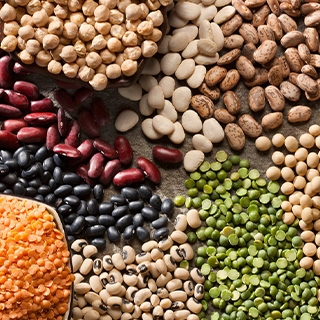Heart diseases pose a significant health concern in Malaysia. According to the Department of Statistics Malaysia, heart disease was the leading cause of death in the country in 2022, accounting for 18.4% of medically certified deaths. This article seeks to explore the landscape of heart diseases, emphasising the pivotal role of nutrition on your heart and 5 heart healthy foods that you should consume.

Heart diseases, which include conditions like coronary artery disease, hypertension, and stroke, significantly contribute to mortality rates in Malaysia. Lifestyle factors, including poor dietary habits, lack of physical activity, and smoking, play critical roles in their development and progression.
Adopting a holistic approach to heart health enables individuals to mitigate their risk and enhance overall wellbeing. Nutrition, a fundamental pillar in both prevention and management, profoundly impacts cardiovascular health in terms of blood pressure, cholesterol levels, inflammation and more.
Certain heart healthy foods including wholegrain, fruits and vegetables, and fatty fish can benefit your heart health and lower your risk of heart disease. In the upcoming section, we will explore the top five foods for heart health.

Whole grains are nutritional powerhouses, containing all the edible parts of the grain, including the bran, germ, and endosperm. Unlike refined grains, which strip away these vital components, whole grains retain their fibre and essential nutrients, making them a cornerstone of heart-healthy eating.
Incorporating whole grains like oats, brown rice, and quinoa into your diet can help to reduce blood cholesterol levels, stabilise blood sugar, and even support weight management – all crucial for a robust heart.
For Malaysians seeking to enhance their heart health, simple substitutions such as opting for 100% wholemeal bread over refined varieties and choosing brown rice instead of white can yield significant benefits.

Let's dive into the vibrant world of fruits and vegetables, a treasure trove of nutrients crucial for heart health. Packed with antioxidants, fibre, and essential vitamins, they provide a powerful defence against heart disease. Surprisingly, a staggering 95% of Malaysians fall short of the recommended daily intake of 5 servings (2 servings of fruits and 3 servings of vegetables).
To support heart health, aim to fill half your plate with vegetables during main meals and enjoy fruits as heart-healthy desserts or snacks throughout the day. Whip up a colourful stir-fry with an assortment of vegetables, toss fruits into your morning oatmeal or yoghurt, and keep sliced vegetables handy for quick, nutritious snacks. With their heart-loving benefits, fruits and vegetables are your ultimate allies in the quest for a healthier heart!

When it comes to heart health, deep-sea fish like salmon and mackerel are standout stars, renowned for their abundance of heart-healthy fats or omega-3 fatty acids, which plays a role in preventing heart disease. But let's not overlook our local treasures such as Indian mackerel (ikan kembung) and anchovies.
Packed with omega-3 fatty acids, these fish possess impressive anti-inflammatory properties, forming a strong defence for your heart. By incorporating them into your meals, you can lower cholesterol levels, maintain blood pressure, ward off blood clots, and fortify overall heart health. To maximise their benefits, aim for at least two servings of fish per week, harnessing their heart-protective powers to the fullest.

Nuts and seeds are exceptionally nutritious, rich in unsaturated fats, fibre, and plant sterols, making them perfect picks for heart health. Consider almonds, walnuts, cashews, chia seeds, flaxseeds, and pumpkin seeds, just to name a few. To make the most of them, opt for unflavoured nuts or seeds to avoid excess sugar and sodium.
Remember, though, nuts and seeds are calorie-dense, so stick to a handful a day. Here are a few easy ways to include them: sprinkle seeds on yoghurt or salads, toss nuts into oatmeal or stir-fries, or blend them into smoothies. These little wonders not only help lower cholesterol levels and regulate blood pressure but also combat inflammation, significantly reducing the risk of heart diseases.

Beans and legumes, often overlooked in Malaysia, are packed with heart-healthy benefits. Rich in protein, fibre, and antioxidants, they aid in lowering cholesterol, stabilising blood sugar, and promoting satiety. Examples include chickpeas, lentils, black beans, kidney beans and soybeans. The soy protein found in soy-based foods like tofu and soy milk has been proven to reduce heart disease risk.
Here are a few practical ways to incorporate them into our diet: add cooked beans to salads or soups, blend them into dips such as hummus, or use them as a protein-rich base for vegetarian dishes. And let's not forget about dhal curry, a beloved Malaysian dish featuring lentils, which adds both flavour and heart-healthy benefits to our meals. Including beans and legumes in daily meals enhances heart health while savouring Malaysian cuisine's diverse flavours.
In conclusion, adopting a heart-healthy diet rich foods in whole grains, fruits, vegetables, deep-sea fish, nuts, seeds, beans, and legumes are essential for preventing heart diseases (as well as avoiding developing conditions such as high blood pressure, inflammation and high cholesterol levels) and promoting cardiovascular health or good heart health. However, diet alone is not enough. Being physically active, abstaining from smoking, and limiting alcohol intake are also crucial components of maintaining a healthy heart.
By making informed dietary choices and incorporating these foods into their daily regimen, along with leading an overall healthy lifestyle, individuals can safeguard their heart health and enjoy a longer, healthier life.
References
This article is contributed by
Georgen Thye, Consultant Dietitian
BSc. (Hons.) Nutrition and Dietetics, IMUCouncil Member of the Malaysian Dietitians' Association (2021-2023)